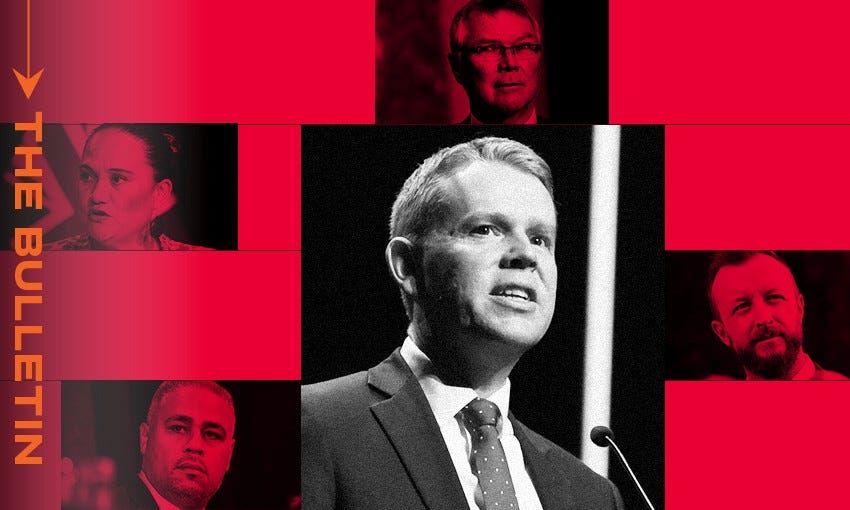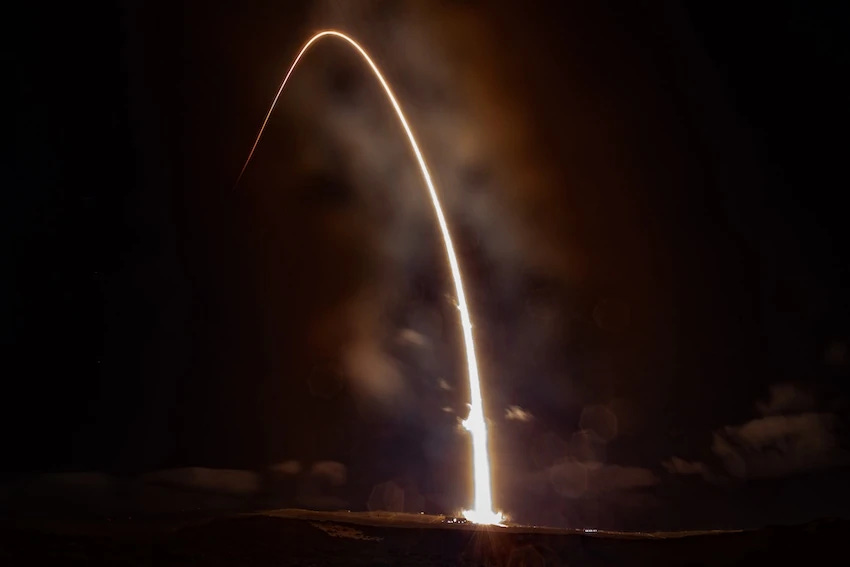What's in and what's out for Labour's 2026 campaign
The battle for the next election starts now.
Mōrena, and welcome to The Bulletin for Monday, December 2.
In today’s edition: PM admits coalition action has damaged Crown-Māori relationship, questions over whether Gumboot Friday can scale up its counselling service quickly enough, and senior ministers raised concerns about the commitments the government made to survivors of abuse in care. But first, what’s on the table as Labour eyes a return to the Beehive.
Election campaign starts now
We’re still about two years out from the next election, but the Labour Party has kicked its plan to boot National out after a single term into gear. The party held its annual conference in Christchurch over the weekend, laying out some key priorities and promises should it make it into government come 2026. As the Herald’s Thomas Coughlan reported, leader Chris Hipkins promised to build the new Dunedin hospital at the level it had been promised prior to the 2023 election, before the coalition scaled back the project and prompted major protests in the South Island. While the coalition has copped a lot of fire over its decision to commit to a smaller rebuild, some will remember that Labour promised back in 2017 under Jacinda Ardern to start work on a new hospital in its first term.
It was also announced yesterday that a Hipkins government would reintroduce the Smokefree Aoteaora policy and invest in a publicly owned interisland ferry service with some rail capability, while MP Kieran McAnulty was confirmed to chair the 2026 campaign for Labour. And, perhaps most interestingly, Hipkins said that under a Labour government, New Zealand would not join the Aukus security alliance – and would be withdrawn from it should the coalition get us in there first.
The implications of the Aukus call
For those who are understandably still a bit confused by Aukus, The Spinoff’s Joel MacManus wrote a helpful explainer back in May. In short, it’s a military partnership between Australia, the United Kingdom, and the United States. But since its first pillar focuses on nuclear-powered submarines, and we have a well known anti-nuclear stance, there hasn’t been any need for us to be involved. Pillar two, however, is focused on things like cybersecurity and information sharing, so there’s a valid reason New Zealand might be keen to sign up.
Hipkins’ decision to take a strong stance should he become the next prime minister will present challenges for the current government. As Dan Brunskill at Interest noted, governments tend to seek bipartisan support for foreign and defence policies, meaning the coalition would have to go out alone should it be invited to join Aukus. Nevertheless, progress on this could still be a while off – New Zealand hasn’t actually received an invite to join pillar two of the pact, though early conversations have started. Labour has spent much of its time in opposition criticising the government for cozying up to the United States through its exploration of Aukus, while the government has said it’s only continuing work that was started under Labour. Former political enemies Don Brash and Helen Clark are among the critics that have warned the government about its shift in foreign policy.
And, in an interview with RNZ’s Guyon Espiner last week, China’s ambassador to New Zealand Wang Xiaolong warned that were we to join Aukus, it would have negative consequences for our critical relationship with China. "We hope that when weighing up this all-important decision, New Zealand will take into account its own long-term best interests, the potential implications for regional security, and the impact on the relationship between China and New Zealand,” he said.
Tax debate, but no tax policy
Of course, it wouldn’t be a Labour conference without a tax debate – especially given the party has already made some rather costly promises. Labour has started sowing the seeds for another shot at implementing some form of capital gains or wealth tax, reported Maiki Sherman for 1News. There’s still no policy ready to be put forward publicly, however, though party members backed a proposal to move forward with work on a new tax, meaning it’s likely one will end up front and centre of the election campaign.
If you’re getting a strong sense of déjà vu, you’d be right. Labour has a strong “will they, won’t they” relationship when it comes to campaigning on tax reform – though Hipkins has made it clear he intends to listen to his party this time around and return to “traditional” party values. Writing for The Sunday Star-Times, commentator Vernon Small questioned whether Labour will be able to win a debate it has lost on several previous occasions, noting that deciding whether to run with a capital gains or wealth tax is only part of the debate. For example, there’s the question of whether Labour will choose to revisit the “tax switch” idea – one that would mean using revenue raised from any new taxes to cut taxes elsewhere – or else try to win over wary voters with the possibility of paying more without an instant reward. Politik’s Richard Harman noted (paywalled) the internal division within Labour’s wider membership over what tax policy to pursue, and criticism from some that Hipkins was responsible for dumping the policy in the run up to last year’s election.
Polling boosts Labour’s confidence
Meanwhile, Labour will be feeling buoyed by internal polling that shows the race could already be tightening up. As reported by Stuff’s Bridie Witton, the latest Talbot Mills poll, provided to Labour on a weekly basis, has the party one point ahead of National – 32% to 31%. Hipkins is also a nose ahead of Christopher Luxon as preferred prime minister. Of course, this is just one poll and of just a 700-strong sample – for Labour to really feel confident, it would need to see this same result replicated in a major survey and, so far, these numbers are an outlier (a recent Curia poll had National seven points up on Labour, while an October 1News Verian poll showed an eight point gap).
Two years out from the next election, let the games begin.
An open letter about the future of The Spinoff
As many of you will have already seen, last week we published an open letter from The Spinoff’s CEO Amber Easby, editor Madeleine Chapman and founder Duncan Greive outlining the financial situation we find ourselves in and why going public with a big, audacious goal to double the number of paying members we have is our last, best shot at retaining the ability to carry on doing what we do.
Please read if you haven't yet. We can not thank you enough if you responded yesterday or are already a member. If you aren't a member, please consider becoming a member today.
‘I think there's more division’: PM admits coalition action has damaged Crown-Māori relationship
Prime minister Christopher Luxon has conceded that Crown-Māori relations are “probably worse” now than they were at the time the coalition came into power. However, in a wide-ranging interview with Q+A’s Jack Tame, Luxon once again defended his decision to allow Act’s Treaty Principles Bill to be introduced to parliament. "I don't like the bill at all," he said. "I don't think it's the right way to deal with race relations in this country. We came to a compromise that is quite normal in coalition governments and MMP environments, and that will continue to be normal going forward."
Luxon said debate over the bill took the longest to resolve during coalition negotiations in late 2023, but would not say whether or not it was a bottom line for Act. But David Seymour was more open, telling Q+A that he never threatened to send New Zealanders back to the polls if National didn’t agree to support the bill to first reading.
At the Labour Party conference over the weekend, reported RNZ’s Lillian Hanly, MP Willie Jackson said the coalition was taking the country down “a path of division and hate”.
Can Gumboot Friday provide $24m worth of counselling sessions in four years?
Questions have been raised about whether or not the I Am Hope Foundation can scale up its counselling service as quickly as it promised when it secured $24m in government funding. As The Spinoff’s Lyric Waiwiri-Smith reports this morning, Gumboot Friday – the charity founded by former comedian Mike King – will need to provide 3,333 counselling sessions every month for the next four years to be able to claim all of the $24m in funding afforded by the government earlier this year. If not, the Ministry of Health will be able to keep the funds.
But one therapist has expressed concern at the charity’s ability to upscale at the required rate, telling The Spinoff she had been waiting for months to be onboarded with Gumboot Friday, despite one of the ministry’s justifications for its funding being that Gumboot Friday was “capable of scaling up service delivery quicker than an organisation that would need to build a whole service”. The therapist was one of 400 waiting to be onboarded in early November, but was told the charity can only take on another 150.
Research shows that New Zealanders value the arts. But do we understand how they’re funded? Or what it takes to sustain the infrastructure of creativity?
Arts funding in Aotearoa is a crucial but complex ecosystem. Toby Morris unpacks the detail and brings it to life – revealing how public money flows through it – so that the next time you’re enjoying a show, gallery, or community festival, you’ll have a better idea of how it came to be. Learn more here. (sponsored)
Click and Collect
New rules, to be announced today, will make it easier for the private sector to pitch infrastructure ideas to government.
Police are seeking to expand the list of gangs subject to the patch ban.
A New Zealander was working as a medic evacuating civilians for an international charity in Ukraine. Except his credentials were fake, and his story doesn’t seem to add up.
Fire and Emergency NZ says it is still unable to release its review into how it responded to the fatal Loafers Lodge fire in Wellington 18 months ago.
The public release of a report that revealed a lack of confidence in a French construction firm’s forecasts on the $5.5 billion City Rail Link was a complete “cock-up”.
Even in the rain, Mount Smart stadium was a sea of blue and black over the weekend as Auckland FC played their fifth match of the season. As BusinessDesk’s Gregor Thompson reports (paywalled), merch sales are through the roof.
Starlink satellites will soon bring near total cell coverage to New Zealand. What might that mean? Duncan Greive watches One NZ head to space. After having her first mammogram, Anna Rawhiti-Connell finds efficiency, reassurance and care in a beleaguered public health system. Books editor Claire Mabey shares some tips for getting back into reading for pleasure this summer. Liam Rātana urges Air New Zealand to ditch the flashy safety videos and bring back flights to Kaitāia. Comedian David Correos takes us through his life in television. Ali Reid says thank you to the family who gave her child a heart.
That’s it for today. Thanks for reading and see you back here tomorrow.
Want to get in touch? Join the conversation in the Substack comments section below or via email at thebulletin@thespinoff.co.nz if you have any feedback on today’s top stories (or anything else in the news).
If you liked what you read today, share The Bulletin with friends, family and colleagues.

















🤔Interesting to see Luxon on Q & A when confronted with the Treaty Bill NOT being a deal breaker for ACT - FFS if you are caught out stop repeating the lie & admit you are stupid & didn't understand what ACT said 🤣 OR you got hoodwinked by them 😱 OR what is really the case, it suited you to have ACT take the flak for what you & your rich mates wanted but were too chicken to front yourself? 🤬 Obviously the developers & money people who want to do things with little restraint by the NZ public & Maori in particular, have been donating to National for years to achieve that outcome, and along comes the perfect cover 🤷 - enable/blame ACT to do your dirty work & take whatever political blowback happens while you claim "it's not OUR fault" - cowardly, dishonest, & obviously couldn't care less about the people of Aotearoa and our future - either environmental or race relations 😥
What, if anything, happened re the “Captain’s Call?” Labour had the perfect opportunity to introduce a CGT during the 2020-23 term, it was party policy, and yet the Captains overruled it — i.e. Chris Hipkins and, earlier, Jacinda Ardern. This I felt was an absolute betrayal.